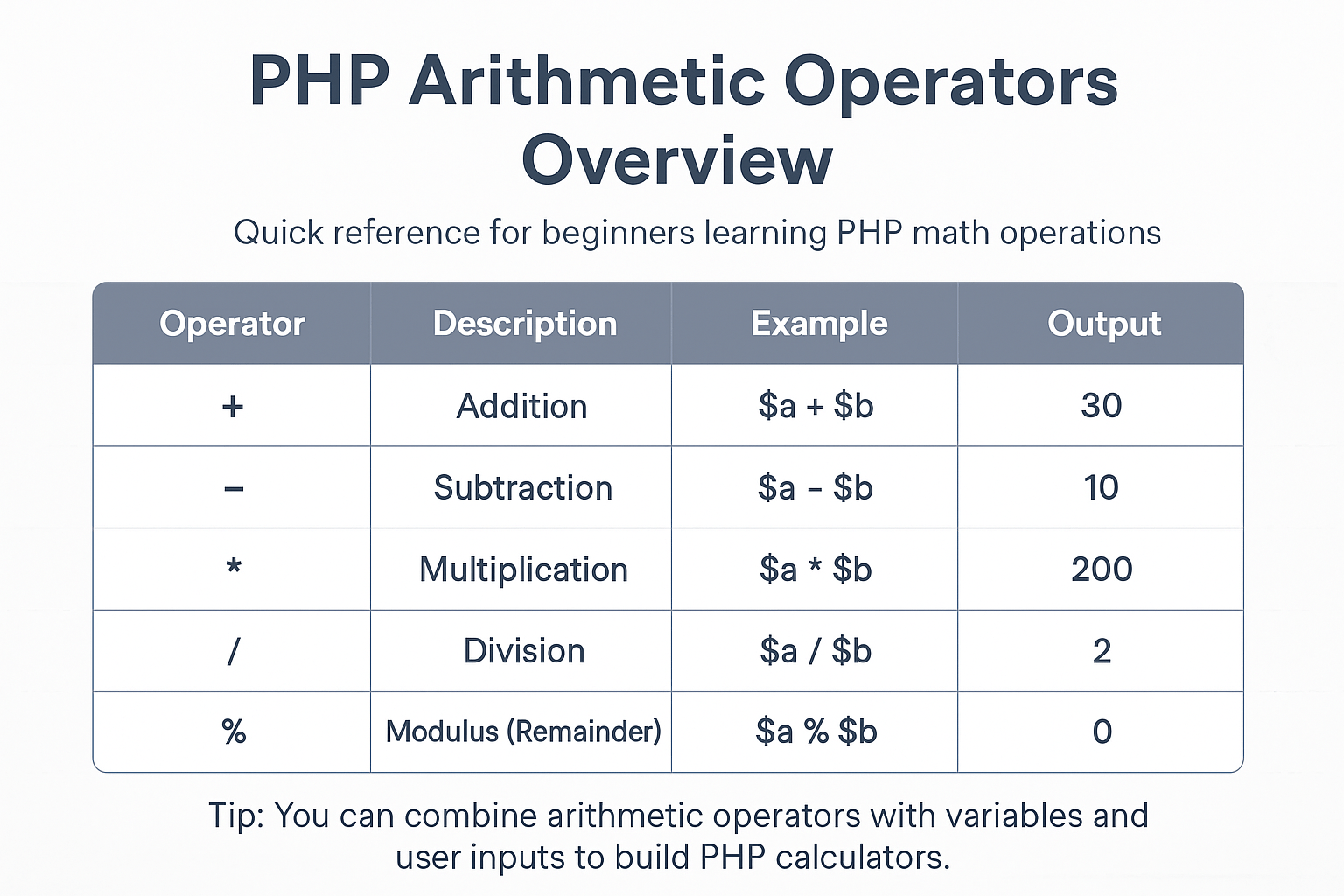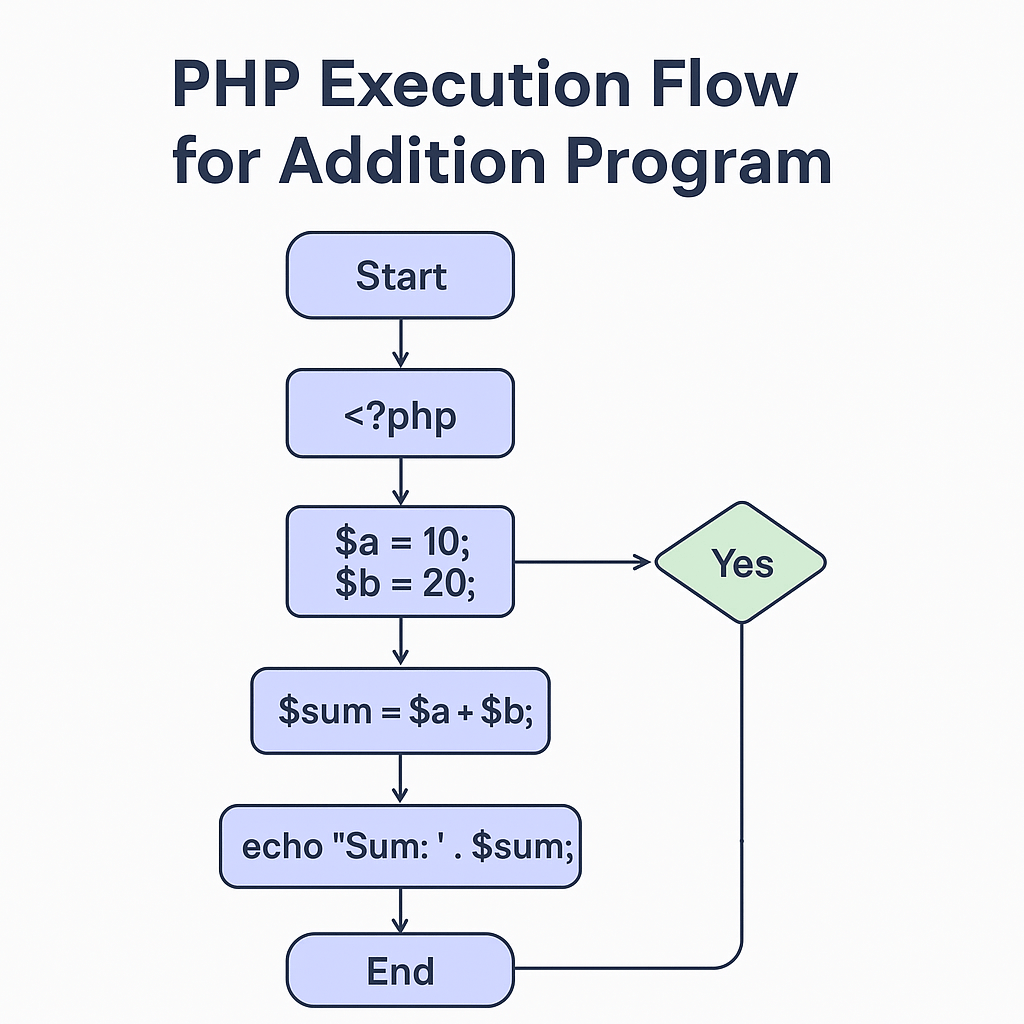The sum of two numbers in PHP is calculated using the + operator.
Example:
<?php $a = 10; $b = 20; $sum = $a + $b; echo "Sum: " . $sum; ?>
Output: Sum: 30
This simple program adds two numbers and displays the result in PHP.
Adding numbers is one of the first steps when learning PHP. It teaches you how variables, operators, and echo statements work together. Whether you’re building a calculator, billing system, or data-processing script, understanding addition is essential to handle arithmetic logic in PHP efficiently.

Key Takeaways of Sum of Two Numbers in PHP
| Concept | Description |
|---|---|
| Operator Used | + (Addition Operator) |
| Variables | Store numeric values like $a, $b |
| Output | Displayed using echo |
| Use Case | Billing, reports, data analytics |
What is the Sum of Two Numbers in PHP?
In PHP, arithmetic operations like addition, subtraction, multiplication, and division are handled using arithmetic operators.
To find the sum of two numbers in PHP, you use the + (plus) operator, which adds two numeric values and stores the result in a variable.
The syntax is clean and beginner-friendly, making it one of the first programs you’ll encounter while learning PHP.
Here’s how it works in the simplest form:
<?php $num1 = 15; $num2 = 25; $sum = $num1 + $num2; echo "The sum of $num1 and $num2 is: $sum"; ?>
Output:
The sum of 15 and 25 is: 40Explanation of the Code:
$num1and$num2– These are PHP variables that hold the two numeric values.$sum = $num1 + $num2;– The addition operation takes place here. The result is stored in$sum.echostatement – This prints the output to the browser screen.- The concatenation operator (
.) is used to join text and variables into a readable output.
This simple example demonstrates PHP’s ability to handle arithmetic easily, making it ideal for tasks like financial calculations, grade averages, or form-based data processing.

How to Take User Input for Sum in PHP (Using HTML Form)
In real-world applications, values are rarely fixed. You often need to accept user input — for example, when creating an online calculator or form that collects numbers from users.
Here’s how you can build an interactive form to accept numbers and calculate their sum dynamically:
<form method="post">
<input type="number" name="num1" placeholder="Enter first number" required>
<input type="number" name="num2" placeholder="Enter second number" required>
<input type="submit" value="Add">
</form>
<?php
if($_POST){
$a = $_POST['num1'];
$b = $_POST['num2'];
$sum = $a + $b;
echo "<h3>Sum = $sum</h3>";
}
?>
Sum of Two Numbers in PHP- How This Code Works:
- HTML Form Section:
- The
<form>tag creates a simple user interface for input. method="post"sends data securely to the PHP script.- The
<input type="number">fields ensure users can only enter numeric values.
- The
- PHP Processing Section:
if($_POST)checks whether the form has been submitted.- The entered values are captured using
$_POST['num1']and$_POST['num2']. - The values are added using the
+operator, and the result is stored in$sum. - Finally,
echodisplays the calculated sum on the screen.
- Example Interaction:
- Suppose a user enters
12and8in the fields. - The output displayed will be:
“Sum = 20”
- Suppose a user enters
Additional Tip: Handling Non-Numeric Inputs
To make your code more reliable, you can validate the input to ensure users only enter valid numbers:
if($_POST){
$a = $_POST['num1'];
$b = $_POST['num2'];
if(is_numeric($a) && is_numeric($b)){
echo "<h3>Sum = " . ($a + $b) . "</h3>";
} else {
echo "<p style='color:red;'>Please enter valid numbers only.</p>";
}
}
This small validation step improves user experience and prevents calculation errors when users accidentally submit invalid data.
Pros & Cons of Sum of Two Numbers in PHP
| Method | Pros | Cons |
|---|---|---|
Static Values ($a=10; $b=20;) | Simple for learning | Not flexible |
| User Input (Form) | Interactive, real-world use | Slightly longer code |
Real-Life Example of Sum of Two Numbers in PHP: Where It’s Used
This logic is commonly used in:
- Billing systems to calculate total price or tax.
- Online calculators to perform arithmetic operations.
- Form data processing, such as adding marks, scores, or weights.
For instance, e-commerce platforms built with PHP — like WooCommerce — use similar logic to calculate subtotals and totals before checkout.
Practical Applications of Sum of Two Numbers in PHP
- Shopping Cart Calculation at Amazon
Amazon uses the sum of two numbers to calculate the total price of items in a customer’s shopping cart. Each item’s price, when added, gives the grand total the customer needs to pay.
Output: Total price: £79.98 - Ride Fare Calculation by Uber
Uber uses PHP to calculate ride fares. The base fare and the cost per mile are summed up to determine the total fare for a ride.
Output: Total fare: £14.50 - Payroll Processing by Google
Google calculates employee pay by adding the basic salary and various allowances. This ensures employees receive the correct monthly payment.
Output: Total salary: £3500
Sum of Two Numbers in PHP: Interview Questions Guide
Let’s delve into some of the most frequently asked questions about “Sum of Two Numbers in PHP.” Though this concept might sound simple, several nuances and practical applications can fuel an aspiring developer’s curiosity. Here’s a list of queries that aren’t typically covered:
- How can I add two numbers using PHP without using the sum operator?
You can use the math logic involving bit manipulation:
function addWithoutPlus($a, $b) {
while ($b != 0) {
$carry = $a & $b;
$a = $a ^ $b;
$b = $carry << 1;
}
return $a;
}
echo addWithoutPlus(6, 10); // Output: 16
2. Can I receive user inputs for numbers using the command line in PHP?
You can use the readline() function to capture user input:
$firstNumber = readline('Enter first number: ');
$secondNumber = readline('Enter second number: ');
echo "The sum is: " . ($firstNumber + $secondNumber);
In PHP, integers and floats (doubles) can be summed directly. Other types, such as strings or arrays, require explicit conversion to numeric types.
4. How can I sum an array of numbers in PHP?
Using the array_sum() function, you can sum up an entire array effortlessly:
$numbers = [1, 2, 3, 4];
echo array_sum($numbers); // Output: 10
Yes, PHP is loosely typed, so it automatically converts types as needed in operations, possibly leading to unexpected sums if non-numeric strings are involved.
6. What is the maximum sum I can calculate in PHP?
The maximum sum is determined by PHP’s integer size, which is platform-dependent. On a typical 64-bit system, it can handle integers up to approximately 9.2 quintillion.
7. How does PHP handle sums of large floating-point numbers?
PHP uses double-precision floating-point numbers, which offers precision up to around 15 decimal digits but can result in rounding errors for large sums.
8. Can you sum numbers in PHP from a JSON input?
Absolutely, you need to decode the JSON string first:
$json = '{"numbers":[1, 2, 3, 4]}';
$data = json_decode($json, true);
echo array_sum($data["numbers"]);
// Output: 10
These questions aren’t just technical exercises; they offer real-world applications that can help boost your coding proficiency in PHP beyond textbook examples. Understanding these details not only makes you better at problem-solving but also opens the door to more advanced concepts smoothly.
Our AI-powered php online compiler offers a seamless coding experience. Instantly write, run, and test your ‘php’ code with the help of AI. It’s designed to streamline your coding process, making it quicker and more efficient. Try it out, and see the difference AI can make!
Conclusion
Sum of Two Numbers in PHP teaches foundational skills in arithmetic operations and PHP syntax, paving the way for more advanced coding. Once you grasp it, you’ll feel a sense of accomplishment that boosts your confidence. Feeling motivated? Check out Newtum for more insights into Java, Python, C, C++, and beyond.
Edited and Compiled by
This article was compiled and edited by @rasikadeshpande, who has over 4 years of experience in writing. She’s passionate about helping beginners understand technical topics in a more interactive way.



